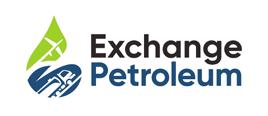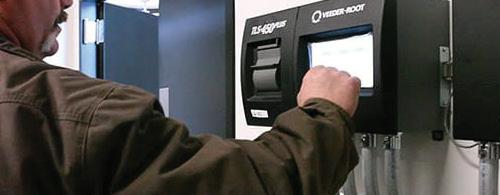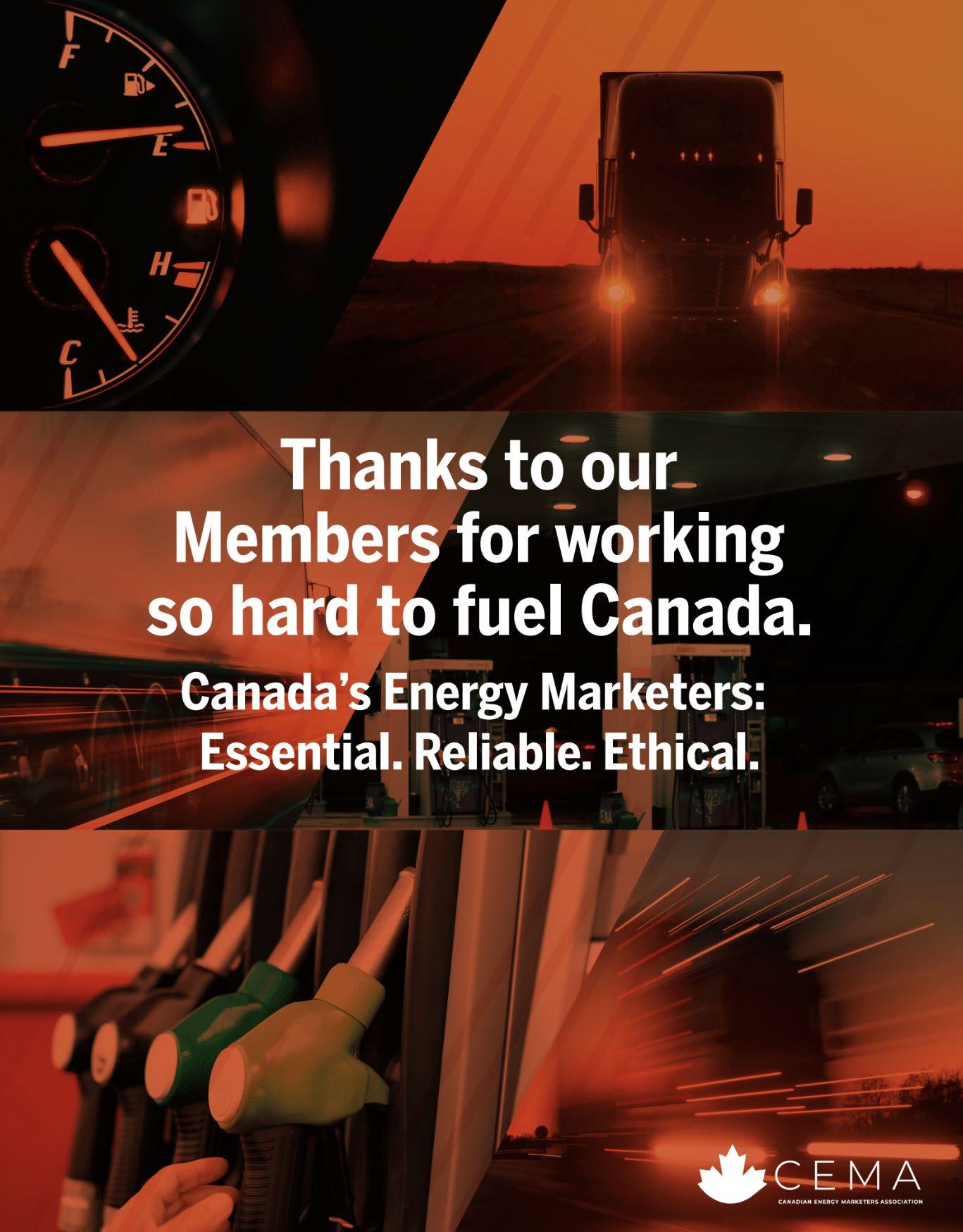

FULL MEMBERS


























ASSOCIATE MEMBERS






















































CEMA extends its sincere appreciation to Waleco Inc. and Dover for their generous support as Presenting Sponsors of the 2025 CEMA Golf Challenge.

CEMA’s mission is to support and elevate Canada’s small and medium-sized energy marketers, who are responsible for nearly 100,000 direct and indirect jobs across the country and are deeply committed to ensuring that innovative energy products, including low-carbon transportation solutions, are readily available to Canadian consumers.
CEMA ensures the voices of its membership are heard at all three levels of government in a fair, consistent and advocacy-first manner – members who include progressive leaders responsible for the distribution of diverse products like gasoline, diesel, heating oil, propane and aviation fuel, as well as low-carbon transportation energy solutions including renewable fuels and electric vehicle charging stations across a vast geography, to diverse industries, and to millions of Canadian consumers.


STEWART | PRESIDENT & CEO
Dear Members,
On behalf of CEMA, I would like to extend my heartfelt thanks to each of you who joined us at our annual golf tournament. This event is always a highlight of the year, bringing together colleagues, friends, and partners from across the industry, and last week was no exception.
As this marks my final message as President, I want to express how truly grateful I am for the opportunity to serve this outstanding association. It has been an honour to work alongside such dedicated members, volunteers, and industry leaders who continuously demonstrate passion, professionalism, and camaraderie.
Together, we’ve not only built stronger connections but also advanced our industry in meaningful ways. I have been inspired by the collaboration and generosity of spirit within this community, and I am confident that CEMA will continue to thrive under future leadership.
Thank you once again for your support, your friendship, and for making this year’s tournament a success. I look forward to seeing many of you in Halifax!
With gratitude,
Jennifer Stewart President and CEO
Canadian Energy Marketers Association



CEMA
In this episode, host Catherine Clark talks to David Adams, President and CEO of the Global Automakers of Canada. The pair discuss the impact of U.S. tariffs and Canadian government mandates on the auto industry, along with the uncertainty caused by U.S. policies and the challenges of meeting zero-emission vehicle targets. Adams also describes the potential for Canada to lead in electric vehicle (EV) development, focusing on longterm investments and alignment with global trends. Listen here.
Follow CEMA on LinkedIn and X for the latest in energy policy, thought leadership, and content and event updates from membership and stakeholders.

CEMA gratefully acknowledges Parkland Corporation as our Eagle Sponsor for the 2025 CEMA Golf Challenge.

This update serves as a recap and reference point for our Members regarding the latest policy impacts on the energy market as well as industry trends. We will continue to monitor and communicate any policy changes directly to Members as they happen.
Emissions cap will end Canada’s energy superpower dream
The negative economic impact of Canada’s proposed oil and gas emissions cap will be much larger than previously projected, warns a study by the Center for North American Prosperity and Security. The report concluded that the cost of the emissions cap far exceeds any benefit from emissions reduction within Canada, and it could
push global emissions higher instead of lower. Since Canadian conventional oil and natural gas have lower emissions intensity than global averages, reducing that production would actually increase global emissions, resulting in an infinite price per tonne of carbon. You can read the complete study here
Canadian gasoline sales level off as EV adoption rises
Gasoline demand in Canada levelled off in 2024, with sales increasing just 0.5 per cent over the previous year — a trend partly driven by the rise in electric vehicles, the country’s statistics agency said September 22. The largest declines in gasoline sales were found in Quebec, where demand dropped 3.5 per cent in 2024, and B.C., which saw a 1.6 per cent drop. Both provinces have provided the strongest incentives to encourage EV adoption, though they have weakened over the past year. In August, Prime Minister Mark Carney’s government paused its electric vehicle sales mandate for at least a year, pending the results of a 60-day review.
Ottawa discussing future emissions cap with Alberta, oil companies: minister
The federal government is in discussions with Alberta and the oil industry about the future of the sector’s emissions cap, Energy Minister Tim Hodgson said on September 12. At a news conference in Winnipeg, Hodgson said both the province and industry agree with the federal government that there needs to be a “fundamental change in the emissions intensity of the oilsands.” After Prime Minister Mark Carney met with Alberta Premier Danielle Smith on September 10, Smith called the meeting “exceptionally productive.”
Canada, BC governments approve KSI Lsims LNG project on Pacific coast
The federal government and the province of British Columbia have approved the Ksi Lisims LNG project, a proposed liquefied natural gas export terminal to be built on Canada’s northwest Pacific coast. The approval issued on September 15 formally authorizes Ksi Lisims under the Impact Assessment Act, the sweeping regulatory framework that governs major infrastructure projects in Canada. It sets the stage for a possible final investment decision before the end of the year by the project’s proponents, who have said construction could begin this year, with the site, located on B.C.’s northwest coast near the community of Gingolx, operational by 2029.
Alberta changing industrial carbon tax program to recognize company investments
The Alberta government is changing its industrial carbon tax program to allow companies to avoid paying provincial fees based on emissions by investing in their own emissions reduction projects instead. Premier Danielle Smith says the move, likely to come into effect this fall, would support economic growth while ensuring companies work to lower emissions. She says the province is also allowing smaller companies that don’t meet the emissions threshold to opt out of the carbon pricing system for 2025. Alberta indefinitely froze its industrial carbon price at $95 per tonne of emissions in May. Smith said at the time the move was a critical step in keeping industry competitive throughout Canada’s tariff fight with the United States.
Regina city council to consider temporary halt of electric bus purchases
A lack of federal funding may force Regina to backtrack on plans to replace more city buses with electric models. Forty-nine transit buses in the city’s fleet will need to be replaced over the next five years. That many electric models will cost an estimated $108 million, compared to diesel models at a cost of $49 million by 2030, says a city report. The city’s fleet replacement reserve is too depleted to cover the cost of more electric buses without outside support, according to the city. The report recommends purchasing diesel buses through 2030 in order to avoid any reductions in existing transit services.
Quebec premier promises new legislation inspired by federal major projects law
Quebec Premier François Legault says his government will table new legislation to speed up environmental approvals, modelled on the federal major projects law. During a September 21 appearance on popular Quebec talk show Tout le monde en parle, Legault said the Quebec bill will be “equivalent” to Bill C-5, Prime Minister Mark Carney’s signature legislation meant to fasttrack projects deemed to be in the national interest.
“Currently, it takes years to get environmental permits,” he said. “We can’t afford that.”
Holt’s renewed vow to end clean fuel charges on consumers is rocking petroleum industry
After months of delay, New Brunswick Premier Susan Holt says her government is re-committing itself to keeping an election promise to terminate “carbon adjuster charges” consumers pay on gasoline and diesel, with December the new deadline for ending the levy. Petroleum companies are expressing alarm at the development and warning of “catastrophic” consequences to their businesses if the new commitment is genuine. In her emailed statement, Holt said she is aware of industry concerns, but the promise to end the adjuster charge will be kept.
N.L. Liberals approve $25M loan to Braya Renewables on eve of election call
The struggling Braya Renewables refinery at Come By Chance has received a $25-million loan from the Newfoundland and Labrador government on the eve of an election call. The announcement came a day after the governing Liberals announced an extension to a power-purchase agreement between N.L. Hydro and Corner Brook Pulp and Paper that sees the Crown utility purchase power from the company at inflated prices. Liberal Premier John Hogan, describing the Placentia Bay refinery as an important provincial asset, announced the repayable loan in a news release on September 11.
Storing carbon underground? There’s less room than we thought, new study suggests
A study published September 3 in the journal Nature is raising a new issue with underground carbon storage. The study, led by researchers from the U.K., Austria, and the U.S., found that globally, approximately 1,460 billion tonnes of carbon
dioxide can be safely stored underground. That’s significantly less than current projections of around 12,000 billion tonnes. That means using all the safe areas for carbon storage would cut global warming by only 0.7 °C, much less than previous estimates of around 6 °C. You can read the full Nature article here.
Declines in output from existing oil and gas fields have gathered speed, with implications for markets and energy security
The average rate at which oil and gas fields’ output declines over time has significantly accelerated globally, largely due to higher reliance on shale and deep offshore resources, meaning that companies must work much harder than before just to maintain production at today’s levels, according to a new IEA report, The Implications of Oil and Gas Field Decline Rates. “Decline rates are the elephant in the room for any discussion of investment needs in oil and gas, said IEA Executive Director Faith Birol. “And careful attention needs to be paid to the potential consequences for market balances, energy security, and emissions.” Read the full report here

CEMA is pleased to recognize Norcan Petroleum Products G.P. as a Birdie Sponsor of the 2025 CEMA Golf Challenge.

Featured in the newsletter on a monthly basis, Advocacy Corner provides insight into federal and provincial political activity of importance to our Members. Read on to find out what decisions are being made, what’s on the horizon, and what it all means for our sector.
After a summer away, the House of Commons is back in session, with some familiar faces and new mandates. Conservative Party leader Pierre Poilievre is finally back in the House, having won a landslide victory in a Battle River-Crowfoot by-election. This comes after Poilievre lost his seat in the 2025 federal election but remained on as party leader. In the uniquely friendly opening session, Poilievre expressed a desire to work with the Liberals on the tariff war but still criticized Prime Minister Mark Carney for overspending, particularly in anticipation of the fall budget. Poilievre and the Conservatives have also called for an immediate cancellation of the emissions cap to facilitate energy investment in Canada.
The fall budget is set to be released on November 4, with the Carney government promising a heavy emphasis on supporting Canadian economic growth.
In another federal change, nearly one year after her shock resignation as Deputy Prime Minister and Finance Minister, Chrystia Freeland has once again resigned from cabinet. She will be leaving her position as Minister of International Trade to serve as Canada’s new Special Representative for the Reconstruction of Ukraine. With internal trade –particularly in the realm of energy security – in the spotlight, her portfolio will be split between Minister Dominic LeBlanc and Minister Steven MacKinnon. Freeland has also announced she will not be running for re-election in the next federal election.
Energy infrastructure updates and the long-awaited kick-off of LNG in Canada were the highlights of the summer. LNG Canada, Canada’s first largescale facility of its kind, has loaded its first cargo of liquefied natural gas. The facility in Kitimat, BC, has begun historic shipments to Asia, already broadening Canada’s energy export market. In addition, the newly approved Ksi Lisims LNG project is expected to produce almost as much LNG as LNG Canada’s first phase by 2028.
In tandem with the LNG boost, the summer was marked by a flurry of fresh announcements and promises with the release of the list of the first round of nation-building projects. In addition to LNG, the list included nuclear projects in Ontario, mines across the West, and carbon capture and wind strategies from coast to coast.
Notably absent from the list was a pipeline, which leaders from the West and a large portion of the Conservative caucus had been hoping for. However, the federal government has promised to select another round of projects, stating that a pipeline is not off the table. Despite the absence of pipeline plans, Energy Minister Tim Hodgson continued to appeal to the West with “energy superpower” promises while speaking at conferences. The government has also emphasized Indigenous collaboration in the projects and prioritized environmental concerns.
Alberta Premier Danielle Smith has also been busy, heading to Alaska to promote Alberta as an energy partner. She also had what she called an “exceptionally productive” meeting with Minister Hodgson to discuss the emissions cap. Smith says the Pathways Plus carbon capture project, which was included in the Nation Building Projects list, has her “more optimistic than ever that the concerns of Albertans are finally being heard.”
In an effort to reduce Canada’s reliance on the U.S as an energy trading partner and to strengthen the idea of becoming an “energy superpower,” federal officials have been looking to new international allies. Canada and Mexico have launched an action plan focusing on trade, energy, and security, with energy infrastructure and corridors at the top of the list of priorities. Canada has also announced a new critical minerals and energy deal with Germany, with the potential for deeper collaboration, including LNG and hydrogen. Finance Minister François Champagne also made Canada’s case to the European Union and Denmark to make Canada Europe’s “supplier of choice.”
Whether it was at home or abroad, the summer months were jam-packed with energy moves for Canada, spurring hope for an energized 2026 for the nation.






•
•
•
• Pin favorite sites for easy access in the Station List
• Request a fuel delivery or email a technician for support in the app to









The following section is a summary of the top media headlines and coverage of key policy and issues impacting the transportation fuel marketing space. Please note that all orange text in the following section is hyperlinked. If viewing electronically, you can click to read full articles directly from the publication source.
Energy security and affordability have trumped fears of stranded assets in recent years, prompting the world’s biggest international oil and gas firms to shift focus back to exploration after years of trying to develop clean energy solutions. 2025 marked the return to boosting oil and gas production and increasing exploration efforts.
Russia is considering extending its current ban on exports of gasoline and introducing a ban on diesel exports as fuel shortages have emerged amid intensified Ukrainian drone attacks on Russian refineries and other energy infrastructure. The government is discussing extending the gasoline export ban for producers through the end of October.
‘A DEFINING MOMENT’: TRINIDAD AND TOBAGO AT A CROSSROADS AS OIL RUNS OUT
Fossil fuels made Trinidad and Tobago prosperous – it produced more than 40 per cent of the British Empire’s oil in 1930 – but now oil production is down to less than 54,000 barrels a day. The question is, should they drill deeper, or shift to a greener economy?
KOREAN MINISTRY OF ENVIRONMENT REVIEWS POTENTIAL BAN ON GASOLINE AND DIESEL VEHICLES
Korea's Ministry of Environment is reviewing a potential ban on the sale of gasoline and diesel vehicles by 2035 as part of its effort to meet Korea's 2025 Nationally Determined Contribution target as submitted to the United Nations. To support this transition, the government plans to introduce new incentives, such as tax benefits on auto and corporate taxes for zero-emissions vehicles.
CRUDE, GASOLINE INVENTORIES CONTINUE TO FALL
The American Petroleum Institute (API) estimated that crude oil inventories in the United States fell by 3.821 million barrels in the week ending September 19. So far this year, crude oil inventories are up just 1.5 million barrels, according to Oilprice calculations of API data. As of that time, gasoline inventories were 1 per cent below the five-year average for this time of year.
DAKOTA SOYBEAN PLANT TO BOOST BIOFUEL INDUSTRY
A new $500-million soybean crushing plant in South Dakota will be able to process 35 million soybean bushels yearly in a BP-backed biofuel venture. Blake Olson, commodities merchandiser at High Plains Processing/SDSP, said the operation provides feedstocks for the biofuel industry.
95 ENERGY INDUSTRY CEOS AND LEADERS SEND ANOTHER OPEN LETTER TO MARK CARNEY, URGING ‘BUILD CANADA NOW’
Six months after their first “Build Canada Now” letter to Prime Minister Mark Carney, 95 energy industry CEOS and leaders have sent another one. The letter states that while some progress has been made, more is needed to stimulate the investment and growth necessary to make Canada an energy superpower.
TC ENERGY BETS ON U.S. EVEN AS CANADA PLANS LNG EXPANSION
TC Energy Corp. will focus on ramping up U.S. investments to meet soaring power demand despite signals Canada is showing a more energy-friendly stance. “The returns we can earn in the United States are significantly more attractive than they are in Canada,” chief executive Francois Poirier said during the 2025 Concordia Annual Summit in New York.
FIRST NATIONS CEO CALLS FOR ‘NORTHERN GATEWAY 2.0’ DESPITE OLD CONTROVERSIES
A First Nations group is pushing for a new pipeline similar to Northern Gateway, an ill-fated project opposed by many Indigenous communities. The chief executive of the National Coalition of Chiefs said an oil pipeline to the northern coast of British Columbia — a project he called “Northern Gateway 2.0” — would lift up Indigenous groups and help them alleviate poverty.
CARBON CAPTURE CONFERENCE OPENS AMIDST ‘BUZZ’ FOR ALBERTA-BASED PROJECTS
“There’s a tremendous amount of buzz right now with the prime minister’s recent comments on how carbon capture will form an important part of Canada,” said Nick Samay, organizer of Canada’s fourth-annual Carbon Capture Conference in Edmonton on September 23. The event was two days long, with Premier Danielle Smith slated to speak on September 24.
FEDERAL CANOLA TARIFF BAILOUT MISSES MARK: MANITOBA GROWERS
Warren Ellis, chair of the Manitoba Canola Growers Association, sees domestic biofuel production as a means for providing stability to the canola market and developing environmentally clean fuel. He says that to grow the biofuel industry, financial incentives are helpful, but market stability is necessary. On this front, the federal government’s $370 million in tariff support measures fall short.
THE PROBLEM WITH DIESEL EXHAUST FLUID: PRAIRIE WINTERS
Diesel exhaust fluid was introduced by the American Petroleum Institute in 2010 to mitigate emissions pollution from diesel engines. It’s housed in a dedicated tank, which needs to be filled periodically, similar to a fuel system. The issue for Prairie farmers is that DEF freezes in temperatures around -11 °C, which can result in the machine becoming unusable, extended downtime, and costly repairs.
HOPA PORTS ACQUIRES IDLE BIOX BIODIESEL PLANT
The Hamilton Oshawa Port Authority announced on September 22 that it has purchased an idle 67 MMly (17.7 MMgy) biodiesel plant located in Hamilton, Ontario, from Biox, with the goal of resuming production at the facility. The biorefinery has been operating on port lands for approximately two decades, converting used cooking oil, animal fats and seed oils into high-quality biodiesel.
HIGHBURY ENERGY INC. AND WBCEC ADVANCE BIOMASS-TO-FUEL PROJECT IN ONTARIO
EFT licensee Highbury Energy Inc. and WBCEC are advancing a $210-million Indigenous-led biomassto-fuels project in Fort Frances, Ontario, after successfully completing a FEED study. The facility will use woody biomass to produce Sustainable Aviation Fuel (SAF) and renewable diesel, creating jobs and positioning Northern Ontario as a leader in renewable fuels.
TRUMP DOJ ARGUES MICHIGAN EFFORT TO SHUT DOWN LINE 5 UNDERWATER PIPELINE INTERFERES WITH U.S. FOREIGN POLICY
The Trump administration is stepping into the legal fight over whether Enbridge can continue to operate an aging pipeline beneath the Great Lakes, arguing that Michigan Gov. Gretchen Whitmer interfered with U.S. foreign policy when she revoked the line’s easement almost five years ago. Justice Department attorneys argue the order clashes with the federal government’s goal of maintaining the flow of energy between the U.S. and Canada.
QUEBEC INNOVATIVE MATERIALS CORP. CONFIRMS THIRD MAJOR NATURAL HYDROGEN DISCOVERY IN NOVA SCOTIA
On September 22, Quebec Innovative Materials Corp. announced the discovery of a third major clean hydrogen zone in Nova Scotia. Soil and gas surveys conducted in the Southampton and EastSouthampton area returned samples with some of the highest concentrations recorded by the company in the province to date.

